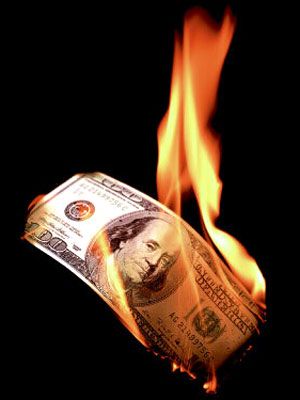
According to a recent article in the New York Times, written by Roger Lowenstein, that’s exactly what some of the 10.7 million families who owe more than their homes are worth are doing. Lowenstien is not talking about the families that can’t afford to pay their mortgage. He’s talking about those who have voluntarily stopped paying their mortgage simply because it no longer makes financial sense.
In the past, such a decision would be considered socially irresponsible, unethical and just downright wrong. But, is forfeiting your home for the sake of saving money and starting fresh so terribly…immoral? Or, are these people wisely playing the game?
Feel free to voice your opinions below.
[Editor’s Note: You can read the original article by following the hyperlink above]
Fine Homebuilding Recommended Products
Fine Homebuilding receives a commission for items purchased through links on this site, including Amazon Associates and other affiliate advertising programs.

Handy Heat Gun

8067 All-Weather Flashing Tape

Reliable Crimp Connectors



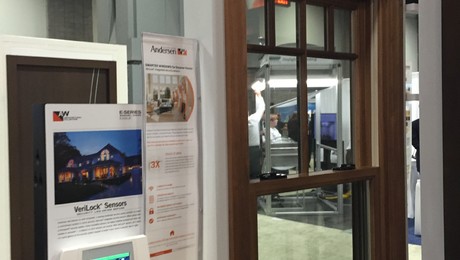
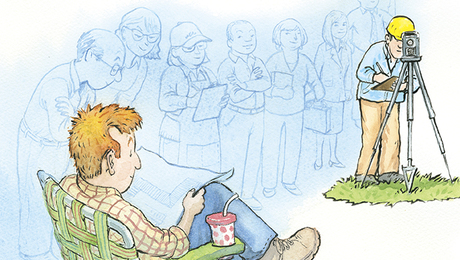
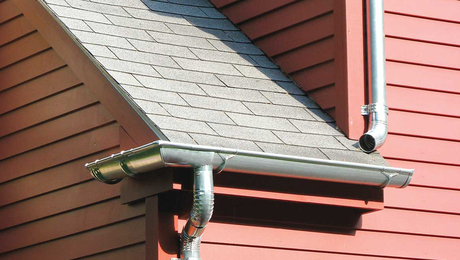



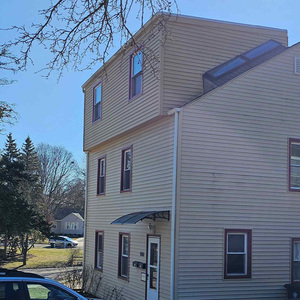


















View Comments
i hope you don't plan on buying a car any time soon. If the house goes into foreclosure you forfeit credit, basically. This is ridiculous. Not to mention where would someone move with the kids. To a rental? Sweet.
i hope you don't plan on buying a car any time soon. If the house goes into foreclosure you forfeit credit, basically. This is ridiculous. Not to mention where would someone move with the kids. To a rental? Sweet.
Did you read the article the link pointed to? Do you understand what the financial institutions were doing? I suspect you don't because if you did,you'd support someone walking away.
A great many of the folks who got into this "underwater" mess, got there because they were willing to pay ridiculous, absurd prices for overvalued homes, thus artificially driving up the cost of new homes for everyone - including first time buyers. Gone are the days of the baby boomer generation when a couple earning an honest living could easily afford a modest home. It is becoming increasingly apparent that home ownership is more-and-more, something for the wealthy.
Why?
In large part because of all those folks willing to overpay for their homes. This isn't rocket science. If you're paying $650K for a 2BR home in an ordinary culdesac, you've GOT to know that the price is either A) NOT going to increase or B) Absolutely decrease.
So for those folks who helped to artificially raise overall home values to absurd levels and are now underwater - I have no sympathy. Nor do I believe they should be permitted to walk away from their mortgages. Absolutely not.
Let the debate begin! LOL
-Ed
Ditto for the bankers who overvalued homes in appraisals, etc.
Carefully considered, when under the right circumstances, "stategic default" MAY be the right decision for an individual homeowner.
Businesses do it all the time. Sometimes it jusy doesn't make sense to "throw good money after bad". If the mortgage and local laws allow for the possibility, it may be the best decision for the borrower.
Both borrower and lender made a bad decision when they entered the agreement. So long as both parties stick to the terms of their agreement, they should each pursue their own best interest.
You gotta do what you gotta do.
This is actually a fairly complex situation. As to the underwater way over-priced houses. Inflating the housing market bubble was a deliberate part of the scams going on. There were about six different types of fraud by which the process has been scammed, and so far no one on Wall Street is being made to do a perp walk, and the bonuses are still being handed out. There are some remaining limitations on the taking out of fire insurance on a neighbor's property, because of the "moral hazard" involved. The speculating banks of Wall Street by both making commission selling on what they knew were poor risk mortgages wrapped together as CDOs, ABSs, MBSs and so forth and betting that the housing market was going to crash by way the Credit Default Swaps, and particularly through AIG. The Counterparty bet making made out big time without having to invest anything that wasn't deducted as a cost of doing business. So far it has been the US public which took the hit on the CDS pay-offs. Remember here that geniuses of Wall Street and Washington made damn sure the the CDS derivative market would not be regulated. Let me put it another way they both created the bubble and burned down the economy and profited both ways, and they expect that the nominal homeowners/occupants will still be forced to be obliged by the same contract which the investment banks violated. Oh, and btw, thanks to their genius securitization process combined with their MERS process they can't find the paperwork on who actually owns the now defaulted mortgages. The only reform process going on currently is through the courts at state and local levels, and couple of cases at the Federal level. Remember too that through their financial advice pension funds have lost major amounts of their funds.
OK, let me get this straight. You guys can't think for yourselves. You couldn't shop around and look at what other homes were selling for and make your own judgement of relativce value. Besides, it didn't really matter anyway, because as far as you knew, homes only went up in value, they never wnet down. After all this was the good old USA. We never had a great deprssion here. That was all a lie. Everyone was in a giant conspiracy against you, including the real estate agent and the appraiser. You were intentionally mislead by the big bad bankers. You wanted the biggest house you could get a loan on, but only if it went up in value - a guaranteed investment, in other words. If it went up, you would get to sell it and keep the profit. If it went down, you could stop paying, give the keys back, and the mortgage lender and their outside investors (or the bank and their depositors and shareholders) should take the loss for you. Then, you believe your credit should still be OK. That way you can do it all again.
Morally speaking, I submit that home-buyers considering walking away from mortgages (whom, it should be noted, do not receive bail-outs) should ask themselves whether they are leading lemmings or following lemmings. ...Hey, we DO share about 90% of our DNA with Lemmings!
Let us not take ourselves too seriously, and above all be thankful that we are able to ask ourselves such questions without the specter of debtors' prisons looming over us. Even Sir Isaac Newton, Treasurer of the UK, when asked about his failure to foresee the end of the South Sea Bubble replied, "I thought it still had legs."
10 million families! That's staggering! The government should bail them out.
Okay! Okay! I'm just kidding! Can't you tell when a guy is kidding?
A number of homeowners, whose mortgages are now higher than the value of the house, didn't get there because of the housing bubble but because of the lending bubble. They bought their houses at a fraction of the current worth, but instead of being responsible home owners, they used their homes as an ATM.
In this scenario, to now abandon the home is quite unethical, in my opinion.
It's interesting how we allow companies to be legal entities for the purposes of free speech (aka near limitless campaign contributions) but don't hold them ethically responsible for reprehensible behavior. The discussion around "strategic default" is just one such area. Corporations have been practicing strategic default for years. When you or I follow their example, however, we're somehow moral reprobates while corporations are rewarded for "protecting shareholder value?"
There are two classes of strategic default here. The first are people who are making a calculated decision to abandon property rather than grossly overpay. Consider a homeowner in Phoenix who took out a $450K loan for a house valued at $475K. That house is now worth $260K. They can expect to pay a total of $1.26M over 30 yrs. Even if the home doubled in value during that time they'd still be paying three times as much as the value.
The second type are people who are struggling to make payments. These people eventually default anyway, and it makes more sense for them to stop making payments early to accumulate savings for first and last and deposit rather than having no money in the bank when foreclosure hits.
This isn't like not paying back a friend who is left empty-handed. The bank still has the house plus whatever money had been paid at the time of default. They made their loan based on their own valuation of the house's. So, if the price was too high, it wasn't just the foolish buyer but the foolish bank that accepted it. The banks are far more financially sophisticated and knowledgable than the buyers, so if you have little symptathy for the buyer, you should have even less sympathy for the bank. It's actually the bank's job not to lend more than the house is worth. That is supposed to be the reason for the appraisal process. However, banks often push appraisers to over-value homes so that they can make larger loans. If they knowingly did that, then they were defrauding the buyer. If they over-estimated the market, they should take their share of the hit. It's not their God-given right to make money. They are supposed to do so by good business practice, not good scheming.
From a business (amoral) POV. It takes a year minimum for the forclosure process to play out; sometimes much longer. I know a guy who lost his business and has been living in, but not paying for, his house for three years. Basically, he pays utilities, and thinks that the property taxman will finally throw him out not the mortgage holder whose already gotten bailout money. He's been banking the payment, and will use that to start over.
I don't know who's right and who's wrong. The banks, as well as the individuals who got in over their heads, not knowing how an ARM works, ASSuming the housing market will continue to go up and up indefinately. My wife and I had a fixed 3 7/8% 15 year mortgage and decided to cash in most(not all) of our other liquid assets and pay off our home several years ago.
We watched the housing bubble come and go, on paper that is.
Paidoff
There was a recent article on people in a California neighborhood who walked away from their mortgages and instead rented houses in the same neighborhood for far less money each month. One woman in particular boasted about how she was able to save enough money to afford an annual pass to Disneyland for her family!
Throughout my life, people who took on financial obligations and then didn't live up to them were called "deadbeats".
You signed a contract that had penalties and things clearly stated as to what would happen if you forfeit it. The law is clear and extensive on this. If you are willing to absorb and accept this and you think it makes sense, by all means. It's no different really than paying Verizon a penalty for getting out of a cell phone contract early. The economy has become such a farce anyway.
Strategic default? Those who bought only on a dream or who were pushed into a fraudulent purchase obligation are at one end of the moral dilemma.
On the other hand, I support the action by those who underwater in their mortgage who live where the jobs have disappeared. No good future for them where they are, encourage them to get out, the earlier the better, to start a new life.
The home price market is bigger than all of us. Once momentum builds we are powerless if we see our home market price fall 40% as has affected many.
Yeah, bankruptcy laws have tightened up a bit but there have always been those who declare for convenience. In about three years they proceeded like the conservative rest of us.
There are situations, as I mentioned where my usual interpretation is changed to urge them to get out & get on.
Saw this in the NY Times. I guess you can rationalize anything if you try long enough.
Using their logic, I'm going to call the Times about my one year subsciption tomorrow. I can still make the payments, but...time for a "strategic default".
Then, it's on to my kids. I can still afford them, but they're so expensive. Time to default on them, too.
I think PayingMyMortgage (and others) have it right. The speculating homeowners weren't the only ones who made bad business decisions, the banks were right there with them. What I do think is immoral is how the rest of us taxpayers who didn't make irresponsible bets are paying for the mess.
So; Yes, it's OK for an underwater homeowner to walk away from his/her mortgage and let the banks take part of the hit. It's just not right that taxpayers then bail out the banks.
Tadit mentioned in an earlier post about the credit default swaps. This is/was the key to the whole thing. Lots of good people bought homes in the last 10 years based on the current values of the house based on comparable sales of similar homes in the neighborhood. They qualified based on income that was real and then the bottom fell out. Partially the bottom fell out because of continued foreclosures. You keep putting foreclosed homes on the market at fire sale prices and the values will drop. Without credit default swaps, the lender's would probably have stopped foreclosures some time ago because they could not afford to sell the houses at that much of a loss. With the hedge of these bets on defaults, they do not care and have caused most of the drop in real estate values because of it. Credit Default Swaps are a bet which was illegal under the law until the financial industry lobbied through a change in the law under the Clinton Administration calling for "Bucket shops to fall under Federal Law preempting a number of state laws that outlawed this type of betting on losses. If you want more information look up "60 minutes" archives in June or July of last year. Once you put it together you see that it is not and was not the failure of a number of people trying to get into homes with stated income loans, but the financial industry changing the way the law read so they could make a buck. Quit blaming the individuals and speculators and look to the real culprits, the Congress of the United States, assorted lobbyists and all those banks and financial institutions that the tax payers bailed out.
Okay, I agree with those homeowners who walk away because what do you think businesses do when things turn upside down? They take a walk and start another business with a clean slate. No reason why the home owner should be left holding a bag of you know what while their homes are upside down and underwater. Lets get real owning a home is more than a living space that sucks all of your assets and leaves you broke. If you go into foreclosure and ask the banks to help save your property they'll send the sheriff to toss you out into the street with no quams,after all it's only business.
I heard on public radio last week that if Bank of America would not give out bonuses to upper management for one year they could adjust all there high rate adjustable mortgages to a fixed rate that most people could afford. I have no sympathy for the greedy bankers. They are a pelage on society. These are not your local commercial bankers they are the greedy investment bankers who spend the time dreaming up ways to take money out of hard working people’s pockets without giving them any value for it
The point here isn't that the people who have lost jobs or were enabled to lie on their loan apps because of their greedy loan brokers. And even though it may feel good to blame the "greedy" bankers with their bonuses, that is a separate issue. The issue is that we used to have a society that deemed it acceptable to tell the truth, make a commitment, then keep that commitment. What we have evolved into is a society that rewards the gamers and cheaters at all levels. Who would have been offering to give the government a bailout by sharing their profits if RE had kept going up at a 20% year clip? Many buyers willingly chose to buy over their ability to pay, believing that they would make some quick cash as their house continued to appreciate. Little white lie to make it happen? No problem. I want my piece of the pie. Mortgage broker encouraging the lie? I want my commission. Bank exec. building the house of cards? I want my bonus. Politicos turning a blind eye to regulatory oversight? I want to keep my lobbyists keeping me in campaign donations and paying their legal teams to write my legislation for me.
How many Flat screens and Denalis were bought on the backs of the endless checkbook that was the equity line of credit?
Now, when it's time to pay the piper they ALL, want to be bailed out. The hapless buyer wants his debt forgiven, despite the fact that the Denali sits in his father-in-law's driveway. The ex-Mortgage Broker wants his unemployment benefits extended and free training for his new green job. The Bank execs got their buyouts, laid low for a couple of quarters and now have their record bonuses on the way. The Politicos log time on CNN or Fox, depending on their leaning, and still haven't even read the bills that their lobbyists wrote in their name.
For those who didn't get a bail out... did pay their bills... didn't game the system... get out your checkbook! It's time we gave up some of our good luck to those who have had a tougher time that we have.
In Feb 8, 2008 Wall Street Jrnl contributor predicted "walkers" fighting to keep their "contractual right" to default: http://online.wsj.com/article/SB120243369715152501.html
Tadit, barewd, & beachbound here outline the scenario Very well, indicating particular imprudence, moral failure, and outright corruption.
Now with "the fire" burning down 30% - 40% of value, we all pay to put it out. At some levels this is a standard correction, new in market particulars, normal in form.
It's called "theft". If I borrowed $20 from you and just decided not to pay it back that's theft. Choosing to not pay the mortgage is the same thing.
I'm no fan of bankers or brokers, but the obligation I incur when I borrow money is my obligation, not theirs. I selected the house. I agreed to the price. I decided the terms of the loan were acceptable. Failure to pay when I have the ability to pay is theft.
From a legal point of view, the mortgage is a contract in which all the terms are spelled out, including what happens if the borrower doesn't pay. Both the lender and the borrower are responsible for making sure the terms are equitable. If a lender makes a loan that doesn't make financial sense to repay, that is the lender's bad decision. (This is true even if the borrower is refinancing to get money for other purposes.)
On the other hand, there is an unstated assumption that everyone will act in good faith. If the bank is acting in good faith, making a real effort to renegotiate bad loans, and avoid foreclosure (and the original loan was made in good faith, not by duping an unsuspecting borrower into a loan with bad terms), it is reasonable to demand that the borrower make a good faith effort to repay. But when the banks use predatory lending practices, and then make no effort to help lenders in trouble, why shouldn't the borrower make use of perfectly legal means to protect his best interests.
Although I wouldn't walk away from my mortgage, it is apparently fine for the bank to walk away from me.
Last year, as the value of my home dropped the bank decided to close my home equity account (which, ironically, I was actually using the money to improve the house). I always paid on time, often made double payments, and the bank never actually looked at my house before they decided to walk away from their obligation to me.
If they can walk from a declining investment, why shouldn't the homeowners be able to?
By the way...it's not exactly "stealing" as someone else said; remember they are the owners of your property. Depending on how long you've had your mortgage, they are making a hefty profit. Also remember that they get their money up front and the principle declines towards the end. How ethical is that?
It is unbelievable to me that anyone can justify walking away on their obligations. You can blame the predatory lenders all you want but these buyers are presumably not stupid and knew what they were signing and if not they shouldn't have been purchasing property in the first place. My wife and I are two people who got caught in the real estate buzz, we purchases two investment properties hoping to fix and filp, and then lost my job and had to move for a new job. So now we are stuck with two rental properties (both with I/O loans and both of which we lose over 1000/month) and renting another and let me tell you it would have been much easier for us to walk away and file bankruptcy but instead we sold our cars, cut our budget to the bare necessities and have never missed a payment.
People need to stop actign like victims all the time and step up to the plate and take responsibility for their actions.
RE Stealing:
Remember the appraisal process, where the bank wanted to make sure what the house was worth...
the "loan-to-equity" value to make sure the mortgage was 80% of the assessed value...
The banks eyes were lighting up, and they were already counting the dollar signs in case of default. They may have only loaned 80K on a 100K property. If they loaned more on less value, bad business decision...
The contract says they get the property if there is a default. To think it is wrong to default, is to assume the bank does not want the property; yet, they asked for it in the contract. Of course now, when they have to darn many to count -- and the values are slipping, they are throwing their hands up.
When considering the banks stake in it, this ain't too bad of a deal. Just sayin'
Thermo: You are officially on my "hero" list. You hit the nail on the head!
"OK, let me get this straight. You guys can't think for yourselves. You couldn't shop around and look at what other homes were selling for and make your own judgement of relativce value. Besides, it didn't really matter anyway, because as far as you knew, homes only went up in value, they never wnet down. After all this was the good old USA. We never had a great deprssion here. That was all a lie. Everyone was in a giant conspiracy against you, including the real estate agent and the appraiser. You were intentionally mislead by the big bad bankers. You wanted the biggest house you could get a loan on, but only if it went up in value - a guaranteed investment, in other words. If it went up, you would get to sell it and keep the profit. If it went down, you could stop paying, give the keys back, and the mortgage lender and their outside investors (or the bank and their depositors and shareholders) should take the loss for you. Then, you believe your credit should still be OK. That way you can do it all again."
go ahead default, drive prices down. I thought they were too high to begin with. I've been saving for a down payment for a house i can live in, not treat as a speculative investment.
That choice is up to the purchaser. All of you knuckleheads that are saying you must pay, have your heads in your ass. There comes a point when you have to objectively look at the entire economic and political situation presently. Not to mention, you would have to be in a state of denial if you think that house prices are going to rise any time soon.
The mortgage contract says that if you stop making payments, the bank can seize the property. So that's what people are doing, walking away from the house. It's not like they are stealing the house from the bank by not making payments and keeping the house. If you calculate your house isn't going to attain the value you're paying for it until 2070, you'd probably rather start over in a new house that you can pay off in 2040, right? The bank tried to make money on lending you money to buy an overpriced house- that was the risk they took, and you (theoretically) covered their risk by paying off more principle than interest at the start. Calculating that risk was their business, and they blew it. If they knew the risk to be higher, the interest rates should have been higher.
Tadit who posted on Jan. 11th really nailed it on the head. The Fed artificially propped up the market for years beyond what a normal housing cycle should be. This, combined with all the crazy slicing and dicing of mortgages, really drove home prices to ridiculous levels. It came down to a point where buyers were encouraged to borrow money to buy an overvalued house or be forced to rent. The banks made a fortune off of all of this bad lending. The taxpayers bailed them out and they spent the money playing the stock market for the past 10 months which had paid them back 2 or 3 times already. The taxpayer / homeowner is left holding the bag. Mortgage lenders are not doing loan modifications because they make more money wringing fees out of the borrowers until they are forced to foreclose. While I agree that walking away from a mortgage if you can afford it is completely immoral, what about those who are just scraping bu or not making enough to cover their expenses? I say screw the mortgage companies, they are making plenty of money. Any bailout should have gone to the taxpayers anyway NOT to the bankers. I have many friends who are bankers who were crying the blues last fall / winter. They are sitting pretty right now. One friend who specializes in ABS says that business is UNPRECEDENTED due to TALF money at 0% interest. Not since the Great Depression has the Middle Class seen this kind of economic situation. The old rules of work hard, buy a home, send your kids to college, and retire with a pension are GONE! We make nothing, have a huge gap in trade, and owe other nations trillions. Hold onto your hats, this will continue to be a bumpy ride.
There are at least two principles in life and doing business:
1) You need to be absolutely true to your word (and especially your signature).
2) You can only do what you can do (...if you are bankrupt, not much you can do).
The whole economy falls apart if you do otherwise ....especially if you blame others for your decisions.
Epirnik, you quote Thermo as saying, “You guys can't think for yourselves. You couldn't shop around and look at what other homes were selling for and make your own judgement of relativce value.” That’s the point, at the time many homeowners bought their homes the relative prices for all homes was high compared to their value today. Before home prices began to plummet it was not easy for average homebuyers, without the benefit of 2010 hindsight, to see that home values would topple so precipitously. Plus as others have stated here, part of the checks and balances of the mortgage system is having a mortgage appraisal of a home’s value. If the appraisal comes back at or above the purchase price a homebuyer is left with the impression that the house is really worth that price. Again we now have the benefit of hindsight to see how the banking industry was rubberstamping home appraisals, but to put all the blame on homebuyers is completely myopic.
I fail to see why there is any discussion on this 'option' at all.
When you borrow, YOU promise to pay it back. Security, such as a house, is only a means the lender uses to reduce his risk. Regardless of the value of the security, YOU still gave YOUR word that you would pay the money back.
When you bought the house as an 'investment,' you took the risk that the investment would be a loser. That's your risk. Why should the lender absorb your loss?
If you represented the home as your dwelling, rather than as an investment, you lied to the lender. He made his decision based upon your lie. He had no intention of being a 'partner' in your 'business venture.' This is called fraud.
OhPeanutButter writes: It's called "theft". If I borrowed $20 from you and just decided not to pay it back that's theft. Choosing to not pay the mortgage is the same thing.
Well Actually it is not exactly the same.
It is more like this:
You borrow $100,000 from me(the banker) to buy property with a sale price of$110,000 with a 10% deposit (your own money) at a monthly interest rate of 5% (actually 5.29% apr) Over 30 years. But I do not actually have 100,000 the fed makes me only have 10% of that $100,000 so although I say I loaned you $100,000 I am only using $10% of what you borrowed. the rest in leveraged debt. I then sell derivatives on the whole $100,000 note. and make thousands.
You also agree that the whole property that you bought was mine should you fall behind in your payments. (including the $10,000 you put in) And I also charged you $3500 closing costs for the privilege of borrowing the money and I charged you another $350 in appraisal fees. And I ask you to pay another $15.00 per month on Mortgage insurance
(most banks require Mortgage insurance if you put less then 30% down unless the mortgage carries a FHA or VA guarantee)
Now after 5 years you are falling behind but until that point you made all payments on time. Here is what you have payed me after 5 years
$24,038.03 in interest with $8,171.27 applied to principal and you still Owe me $91,828.73 and you also payed another $900 for Mortgage insurance.
Now Your home is now valued at around $80,000 I take that house you payed me 33,109 (including the MI) over the past 5 years I sell the house after foreclosure for $70,000 I now have 102209.00 Now that is not great but Lets say you kept paying for another 5 years then You would have payed me 64,417 but you would still owe $81,342.06
I could still sell it for $70,000 thats $134,417
After 10 years of paying me I say you still owe me $81,342
You are out your 64,417 your 10,000 deposit and your $1500
And I get a property worth around $80,000 retail even with the reduced market.
I also file a claim on the mortgage insurance I made you pay for and I get another $80,000.
So How have you stolen anything the only one loosing on this deal is you. You loose all the money you put into the house over the years and you loose your home.
And if you are real unlucky and live in a state were I can go after you for the balance above the sale price of the property I can sell the property at a quick sale well below market then go after you for the remaining balance plus collection fees.
So you go bankrupt to avoid the debt on the remainder of the loan. And you can't even get a rent now because even land lords do credit checks and refuse to lease a apartment to you based on your poor credit.
And I almost forgot that the day after the closing I sold derivatives of on your note and I did it again and again making thousands on it. Unlike when a bank sells a mortgage which they can do only once. When packaged as derivatives I can sell the same note multiple times. And still actually hold the note itself. (like selling shares in a company buy just creating more shares)
Oh and when the people I sold the Derivatives to wanted their returns I claimed the loss and the US government came and bailed me out so I could pay off my debt. Oh and since I never actually gave you any of my own money and I never really was out the $100,000 you borrowed to begin with.
Not exactly the same or as simple as borrowing $20.00 and paying back $20.00 NOW IS IT.
What Banks do is not like how we loan money in fact if you did what they do you would be a joining Bernie Madoff in jail real soon.
KInd of off topic yet
I thought this was interesting Found on Jobs board, Builder looking or new VP of Marketing In TX. It's this one of the Aareas hit hardest by Housing Bubble? (Don't Know I am asking) If it is this is going to be one hard job. Sounds like they want a turnaround genius. But hay there has got to be someone out there reading Fine Homebuilding that can fill their need.
http://www.topbuildingjobs.com/index.php/Vice-President-of-Sales/?action=view_job&retrieverID=156747&jobID=65413
Vice President of Sales
We are doing a confidential search for a VICE PRESIDENT OF SALES AND MARKETING in the San Antonio, TX.
Extensive sales management, sales training and development, and human resource management experience is necessary. Candidates must have exceptional motivational skills with a track record for creating a thriving culture. Over five years of management experience and responsibility for over 200 units per year is preferred. Proven leaders will earn base pay of $90,000 - $110,000 and a total package $125K - $140K.
What does it take to make it with this builder? - A track record for success in your discipline - A drive for results with excellent leadership and motivational capabilities - Self motivation with an entrepreneurial spirit - A passion for learning and teaching others - Great time management skills - A willingness to be the very best - The highest ethical standards in the industry - A positive attitude and a solid work ethic Candidates will have a strong job history in the homebuilding industry and excellent references. Please send your resume via the TopBuildingJobs.com website.
Well, I brought into the American dream. I'm a contractor and I used to flip homes for about 15 years before the 2007 bust. I took me sometime to relized that the deck is stacked against me. No matter what I made, the banks and fellow pimps made bookew $$$$ on every home I touched. I am out of that buisness, and I wish I was out of the house that I'm in. I have zero sympathy for the bankers and brokers who basically though money at me to spend. I'm done with their corrupt world and sleazy tricks. Any of you below who sided
with the banks based on "YourWord" "Commitment" "Rules"
"Honor" are playing by a totally different book. The banks have been in the buisness, in one form or another for a thousand years. They figured out how to screw you before you were born and after you are dead. They play by the devils playbook. No............. I'm not crazy.
How is this a debate? A mortgage is a simple, secure loan. The bank gives me money, I give them a house. If I am able to give them back the money (plus a hefty interest) then they give me back the house. If I don't give back the money, then they keep the house. Simple.
I remember when I was young, my mother gave a $100 loan to a friend of hers who had bad credit. Before my mom agreed to the loan she was wise enough to ask for collateral to which her friend offered a beautiful old Victrola record player. As you probably guessed, her friend didn't pay the money back and my mom still has that Victrola. Again, Simple.
Due to deregulation, banks no longer hold the loans they make on mortages and they haven't for a long time. They only service the loan. Banks make their money on the fees they charge the seller and buyer, and payment for servicing the loan. It's not like it used to be years ago where a bank would keep a loan for 30 years.
Here's the way it works if anyone is interested.
The bank borrows the money from the Federal Reserve on a short term loan for around 1% or less to fund the loan. Next, the bank sells the loan to Sally Mae or Freddie Mac for face value, having made their thousands of dollars on charges and fees. Fannie Mae or Freddie Mac make the loans into asset backed securites like collateralized debt obligations (CDO or CMO). A typical CMO would be for about $10,000,000.00 backed by a $500,000.00 loan which is the asset or collateral. These are then sold to institutional investors like Goldman Sachs, Citi Bank, Calpers, Bear Stearns, Bank of America, and such. They then resell these to other institutional investors like large retirement funds, college funds, large foreign investors, other banks and so on.
After the CMO's were assembled and sold, anyone with the right credentials, such as AIG, could sell insurance on them. Since portfolio insurance is illegal, they called this insurance credit default swaps (CDS). Also, anyone with enough money could purchase a CDS on any CMO. They were not required to have any money invested on the CMO they were buying insurance (CDS) for. In fact, at one time, the banks and investment firms were paying investors to buy CDS's. The sellers of the CDS's were not required to put aside capital in case of an event, like companies the sell regular insurance are required to do. So they didn't. When the value of the CMO went down, then the value of the CDS went up. When the value of the CMO became zero, mark to market, then the owner of the CDS could collect the total original amount, or cash in his insurance. Many hedge funds and individuals made billions in this manner.
Now you can see the genesis of the economic catastrophe. Lending regulations were relaxed and the banks, no longer holding the loans, didn't care if the loans were good or bad. As soon as the loans were made, they sold them to Freddie Mac or Fannie Mae. They had no vested intrest in them. This allowed people to enter the housing market that previously were unqualified and was the engine of the subsequent housing bubble.
To me, this brings up a question. If a person takes out a mortage, the mortage is sold to Fannie Mae and then made into a CMO, then someone purchases a CDS on that CMO and collects on the CDS, shouldn't the mortage be paid and the mortage holder no longer liable for the debt? Like if you buy a new car and total it. The insurance company pays off the dealer and you are no longer responsible for that debt. Or is that mortage being paid for twice?
Anyway, I see no problem with walking away from a mortage. If a bank takes your home and it is worth more than the mortage you owe, how much money do you think the bank will give to you? Your home is the collateral for the loan. The bank isn't losing any money and they made a loan that turned out bad because of their greed. WALK AWAY! From the top down, the whole thing was executed by a bunch of greedy crooks.
It's funny how far personal responsibility in America has degraded, in all aspects of life. But in this topic, the paper I signed to purchase the home I could afford to live in, is a responsibility I hold dear and take seriously. My burn is the "builders" and "speculators" who absolve any responsibility to their own plight. I read that one builder complains about profit going to a bank, yet he built several homes during the easy picking time. I suspect he borrowed on several plots in hopes of making a windfall on several new homeowners, but it's the bankers fault because they offered him the money he asked for? Please....
Walk away from YOUR responsibility (your baby) and sure, you spread YOUR personally created problem (your baby) around to others (grandparents etc...) to take care of. The problem becomes everyone else's problem, but as long as YOU are OK then it's OK? WRONG, I didn't participate in the process that created YOUR baby and it should not be part of my financial obligation to take care of it, unless it's my choice.
I'm an advocate that if you default, for whatever reason, it does not make you a criminal, BUT YOU are still responsible, kinda of like child support. Maybe you'll practice safer financial planning (safer sex) in your future dealings.
Businesses walk away from investments when they don't produce results - if they didn't, shareholders would be up in arms. A mortgage is a business contract - the terms are clearly spelled out, and the penalty from walking away from the mortgage is known to both parties up front. I just can't believe how some posters turn this into a moral and personal responsibility issue, akin to "giving your word". You signed a business contract, the investment isn't working out, and you choose to default. As one of the posters noted in detail, this isn't the world of 50 years ago where your hometown bank had a personal relationship with you and held your mortgage to maturity. If it was, you would see a lot more negotiation, loan workouts, and foreberance to help both parties through tough times. The banking industy has turned mortgages into securitzed vehicles, where everyone is protected, AND PAID, except for the homeowner. Pure business. Only a fool would continue to dump money into a stock investment which has lost 2/3 of its value with, but the "keep your promise" crowd doesn't seem to see a problem continuing to make mortgage payments on a house you bought for $350,000 thats now worth $135,000. Risk goes 2 ways - why would you not limit your risk for your family and heirs?
Businesses walk away from investments when they don't produce results - if they didn't, shareholders would be up in arms. A mortgage is a business contract - the terms are clearly spelled out, and the penalty from walking away from the mortgage is known to both parties up front. I just can't believe how some posters turn this into a moral and personal responsibility issue, akin to "giving your word". You signed a business contract, the investment isn't working out, and you choose to default. As one of the posters noted in detail, this isn't the world of 50 years ago where your hometown bank had a personal relationship with you and held your mortgage to maturity. If it was, you would see a lot more negotiation, loan workouts, and foreberance to help both parties through tough times. The banking industy has turned mortgages into securitzed vehicles, where everyone is protected, AND PAID, except for the homeowner. Pure business. Only a fool would continue to dump money into a stock investment which has lost 2/3 of its value with, but the "keep your promise" crowd doesn't seem to see a problem continuing to make mortgage payments on a house you bought for $350,000 thats now worth $135,000. Risk goes 2 ways - why would you not limit your risk for your family and heirs?
In Texas, at state law is that you can't lose your home if you get into money troubles. Even if a local or out of state mortgage lender comes after them, they can't get to cash cow home....
The majority of the bankers and companies in between the buyer and the home being purchased got their money and high profits knowing the odds of the buyer keeping the home were slim to none....If they were the ones left holding the bag and sweating, I'd say they got what was coming. But, they got off scott-free, and went crying to Uncle Sam.... Each one should be Horsewipped and made to pony-up the loss that every honest and frugal John Q. American will pay in higher taxes and high product costs.
I've read where many, many homeowners from the hardest hit states raise enough money to secretly come to states like Texas and put it down money to not only buy a home, but actually more home for the dollar.... Then, they go back, sell whatever else they have and that isn't bolted down in their under-water-home and they simply walk away with a phone call or a set of house keys dropped in the mailbox or on the desk of their current mortgage owner....
There are few, if any, reasons where mortgage holders would have to do this, like Cancer/medical bills, death of the breadwinner ??, but the majority went into debt for the pure reason of greed or social status rather than common sense.... They, and their family, should "man-up" and take their losses. Few of this lot of people are willing to do so, and want everyone else to keep them in their lifestyle with few changes. Just talk to the average employed guy/gal on the street; most have little clue as what is ahead as their sight is based only from paycheck to paycheck. Others have their eyes on the skyrocketing high gold and silver prices and forget to think about what the world around them will really look like after gold goes $1,500-$3,000 an ounce.
Only an event like "Parting the Red Sea" or quite honestly, a full blown Depression is going to level the playing field for a chance to Start Over.
Hang on and tighten your safety belt, something like one of the two is coming... Looking back, they will see that paying a mortage was the easy part.
Oooh, careful now, BilljustBill, Texas does protect your homestead from other debts, but you better not think you can quit paying your mortgage and not get foreclosed on! It's only common sense; the bank uses your home as collateral. If the bank couldn't foreclose upon non-payment, why would they even lend you the money in the first place? Quick check of the net gives us this reality: "From the time you miss your first payment to the final foreclosure sale its not uncommon for six months or more to pass. In some states this could be more and in others considerably less. Texas residents could find the foreclosure process completed in only around 45 days." http://www.debtworkout.com/forefaq.html
On the part of the homeowner, the question Roger Lowenstein asks is more a question of financial ignorance than it is of morals. Don't forget that if you walk away from a mortgage you lose everything you had invested up to that point - real estate costs, down payments, closing costs, loan payments...everything. AND you have to start all over with ANOTHER mortgage. Sure, you can walk away from a losing investment but if you stuck with it, it is very likely that the investment will reach and surpass it's former value. You need to calculate what you've already invested and what it would cost to start over.
I think it comes down to greed and ignorance - on BOTH sides of the mortgage:
1) The bankers are more greedy than ignorant and lend far more than they should. They do this because they have little or nothing to lose. They are able to reduce or eliminate their risk through different schemes - some mentioned in posts below.
2) The homeowners are more ignorant than greedy and accept loans that put them on the edge of a financial precipice. If circumstances remain the same or improve, they will do ok. If circumstances worsen (house values drop, lose their job, etc) they are pushed over the edge of the precipice and are faced with either defaulting on the mortgage or continuing to pay (if they can) on a money-losing investment.
The numbers below make it easy to see who's ignorant and who's greedy:
1) Est. Foreclosures 2009 - 2011 = 9,000,000 homes
2) Est. Bank failures 2009 - 2011 = 1,100 banks
joechirimoya writes: Oooh, careful now, BilljustBill, Texas does protect your homestead from other debts, but you better not think you can quit paying your mortgage and not get foreclosed on! It's only common sense; the bank uses your home as collateral.
Thanks for helping me with saying what I meant and left out you've got to keep those Texas home payments up to date. If you owe on other real estate and have money problems, as long as you keep you payments on time and current, the people you owe money too can't take your Texas home away, but you may have a stack of leins against it if you ever tried to sell.
Thanks for your help!
Knowing how complicit developers, realtors and lenders have been in creating the housing bubble, I'm not going to lose sleep if a few of them (or a lot of them) lose money or jobs. I see it all the time here in New Orleans where developers work with the public sector and banks to create homebuyer programs to get financially illiterate people into homes where the operating costs (insurance, utility costs, and taxes) are going to make them impossible to keep in neighborhoods where it will be impossible for them to unload without taking a lose.
Moreover, I agree with ha5870 that a mortgage is a secured asset, and that if a person can no longer afford to pay the mortgage forfeiting the asset securing it should end the lender/borrower relationship.
Be careful about "strategic defaults." Whether this is a wise thing to do depends in part on state you live, i.e., is your state a "recourse" or "non-recours" state. In a state that allows recourse mortgages the lender can go after your other assets to satisfy your mortgage obligation. Thus in a state that allows recourse loans you can defalut on the mortgage, the bank will foreclose on the house, and then sue you for the unsatisfied portion of the loan. If a non-recourse state the bank is stuck with whatever it can get for the house.